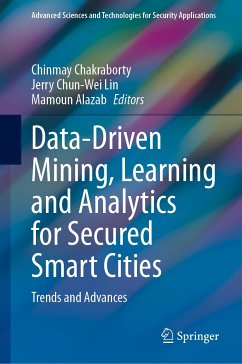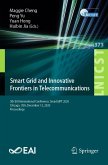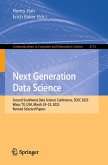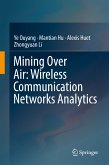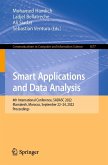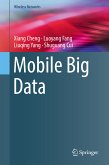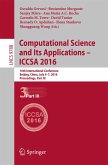Data-Driven Mining, Learning and Analytics for Secured Smart Cities (eBook, PDF)
Trends and Advances
Redaktion: Chakraborty, Chinmay; Alazab, Mamoun; Lin, Jerry Chun-Wei


Alle Infos zum eBook verschenken

Data-Driven Mining, Learning and Analytics for Secured Smart Cities (eBook, PDF)
Trends and Advances
Redaktion: Chakraborty, Chinmay; Alazab, Mamoun; Lin, Jerry Chun-Wei
- Format: PDF
- Merkliste
- Auf die Merkliste
- Bewerten Bewerten
- Teilen
- Produkt teilen
- Produkterinnerung
- Produkterinnerung

Hier können Sie sich einloggen

Bitte loggen Sie sich zunächst in Ihr Kundenkonto ein oder registrieren Sie sich bei bücher.de, um das eBook-Abo tolino select nutzen zu können.
This book provides information on data-driven infrastructure design, analytical approaches, and technological solutions with case studies for smart cities. This book aims to attract works on multidisciplinary research spanning across the computer science and engineering, environmental studies, services, urban planning and development, social sciences and industrial engineering on technologies, case studies, novel approaches, and visionary ideas related to data-driven innovative solutions and big data-powered applications to cope with the real world challenges for building smart cities.
- Geräte: PC
- ohne Kopierschutz
- eBook Hilfe
- Größe: 10.75MB
![Smart Grid and Innovative Frontiers in Telecommunications (eBook, PDF) Smart Grid and Innovative Frontiers in Telecommunications (eBook, PDF)]() Smart Grid and Innovative Frontiers in Telecommunications (eBook, PDF)40,95 €
Smart Grid and Innovative Frontiers in Telecommunications (eBook, PDF)40,95 €![Next Generation Data Science (eBook, PDF) Next Generation Data Science (eBook, PDF)]() Next Generation Data Science (eBook, PDF)89,95 €
Next Generation Data Science (eBook, PDF)89,95 €![Mining Over Air: Wireless Communication Networks Analytics (eBook, PDF) Mining Over Air: Wireless Communication Networks Analytics (eBook, PDF)]() Ye OuyangMining Over Air: Wireless Communication Networks Analytics (eBook, PDF)73,95 €
Ye OuyangMining Over Air: Wireless Communication Networks Analytics (eBook, PDF)73,95 €![Smart Applications and Data Analysis (eBook, PDF) Smart Applications and Data Analysis (eBook, PDF)]() Smart Applications and Data Analysis (eBook, PDF)73,95 €
Smart Applications and Data Analysis (eBook, PDF)73,95 €![Information Management and Big Data (eBook, PDF) Information Management and Big Data (eBook, PDF)]() Information Management and Big Data (eBook, PDF)40,95 €
Information Management and Big Data (eBook, PDF)40,95 €![Mobile Big Data (eBook, PDF) Mobile Big Data (eBook, PDF)]() Xiang ChengMobile Big Data (eBook, PDF)69,95 €
Xiang ChengMobile Big Data (eBook, PDF)69,95 €![Computational Science and Its Applications - ICCSA 2016 (eBook, PDF) Computational Science and Its Applications - ICCSA 2016 (eBook, PDF)]() Computational Science and Its Applications - ICCSA 2016 (eBook, PDF)69,95 €
Computational Science and Its Applications - ICCSA 2016 (eBook, PDF)69,95 €-
-
-
Dieser Download kann aus rechtlichen Gründen nur mit Rechnungsadresse in A, B, BG, CY, CZ, D, DK, EW, E, FIN, F, GR, HR, H, IRL, I, LT, L, LR, M, NL, PL, P, R, S, SLO, SK ausgeliefert werden.
- Produktdetails
- Verlag: Springer International Publishing
- Seitenzahl: 383
- Erscheinungstermin: 28. April 2021
- Englisch
- ISBN-13: 9783030721398
- Artikelnr.: 61667968
- Verlag: Springer International Publishing
- Seitenzahl: 383
- Erscheinungstermin: 28. April 2021
- Englisch
- ISBN-13: 9783030721398
- Artikelnr.: 61667968
- Herstellerkennzeichnung Die Herstellerinformationen sind derzeit nicht verfügbar.
